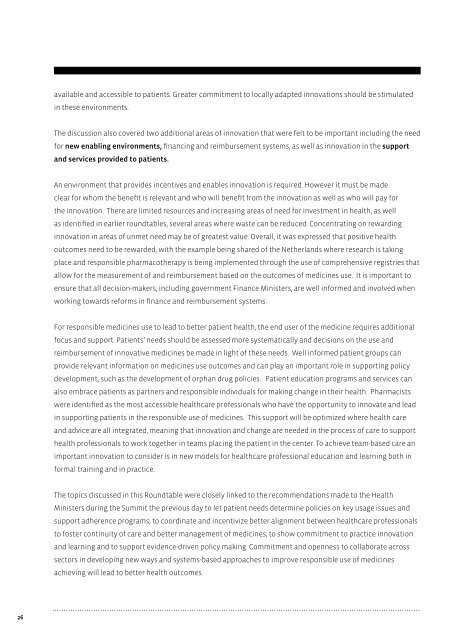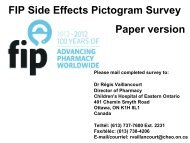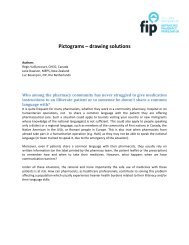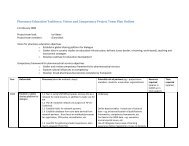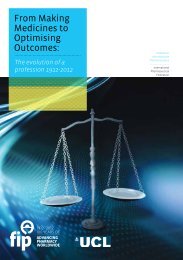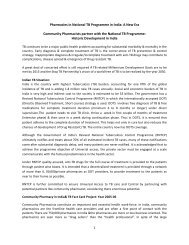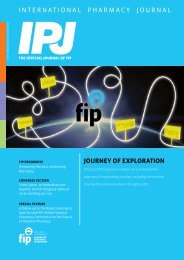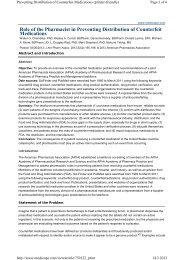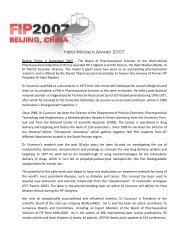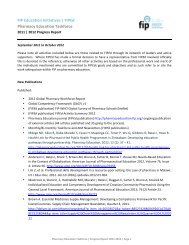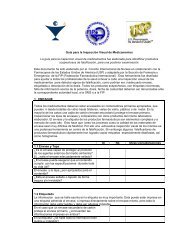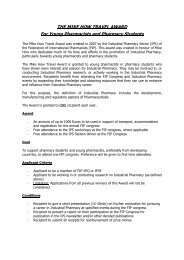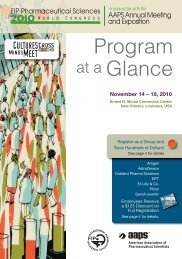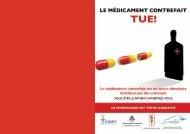here - FIP
here - FIP
here - FIP
You also want an ePaper? Increase the reach of your titles
YUMPU automatically turns print PDFs into web optimized ePapers that Google loves.
26<br />
available and accessible to patients. Greater commitment to locally adapted innovations should be stimulated<br />
in these environments.<br />
The discussion also covered two additional areas of innovation that were felt to be important including the need<br />
for new enabling environments, financing and reimbursement systems, as well as innovation in the support<br />
and services provided to patients.<br />
An environment that provides incentives and enables innovation is required. However it must be made<br />
clear for whom the benefit is relevant and who will benefit from the innovation as well as who will pay for<br />
the innovation. T<strong>here</strong> are limited resources and increasing areas of need for investment in health, as well<br />
as identified in earlier roundtables, several areas w<strong>here</strong> waste can be reduced. Concentrating on rewarding<br />
innovation in areas of unmet need may be of greatest value. Overall, it was expressed that positive health<br />
outcomes need to be rewarded, with the example being shared of the Netherlands w<strong>here</strong> research is taking<br />
place and responsible pharmacotherapy is being implemented through the use of comprehensive registries that<br />
allow for the measurement of and reimbursement based on the outcomes of medicines use. It is important to<br />
ensure that all decision-makers, including government Finance Ministers, are well informed and involved when<br />
working towards reforms in finance and reimbursement systems.<br />
For responsible medicines use to lead to better patient health, the end user of the medicine requires additional<br />
focus and support. Patients’ needs should be assessed more systematically and decisions on the use and<br />
reimbursement of innovative medicines be made in light of these needs. Well informed patient groups can<br />
provide relevant information on medicines use outcomes and can play an important role in supporting policy<br />
development, such as the development of orphan drug policies. Patient education programs and services can<br />
also embrace patients as partners and responsible individuals for making change in their health. Pharmacists<br />
were identified as the most accessible healthcare professionals who have the opportunity to innovate and lead<br />
in supporting patients in the responsible use of medicines. This support will be optimized w<strong>here</strong> health care<br />
and advice are all integrated, meaning that innovation and change are needed in the process of care to support<br />
health professionals to work together in teams placing the patient in the center. To achieve team-based care an<br />
important innovation to consider is in new models for healthcare professional education and learning both in<br />
formal training and in practice.<br />
The topics discussed in this Roundtable were closely linked to the recommendations made to the Health<br />
Ministers during the Summit the previous day to let patient needs determine policies on key usage issues and<br />
support ad<strong>here</strong>nce programs; to coordinate and incentivize better alignment between healthcare professionals<br />
to foster continuity of care and better management of medicines; to show commitment to practice innovation<br />
and learning and to support evidence-driven policy making. Commitment and openness to collaborate across<br />
sectors in developing new ways and systems-based approaches to improve responsible use of medicines<br />
achieving will lead to better health outcomes.


